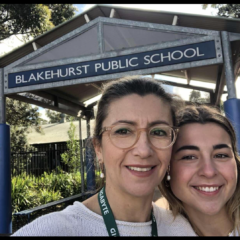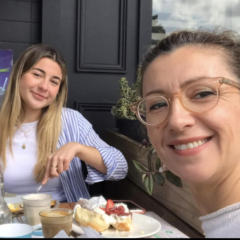Kate’s story: Providing life skills to our children

Kate Sawtschuk writes: When I decided to volunteer to be an ethics teacher at our school almost four years ago, I received a serious and foreboding warning from my then eight-year-old daughter: “Teaching kids is tough.” Luckily, I was not discouraged!
Since then, I have taught ethics classes across all ages at Denistone East Public School and am now the ethics coordinator. I could never have imagined how much I would learn and how many rewarding moments it would bring.
Previously, when I had seen Ethics listed on our school Scripture form, I thought it sounded like a class that taught kids about what was right and wrong and what they should think. When a friend of mine became an ethics teacher and actually described it, I found out this could not be further from the truth!
Ethics classes give children a chance to practise skills like taking turns to speak, listening carefully to other students and forming and expressing their own ideas. Lessons are designed to enhance critical thinking and ethical reasoning skills, helping children make decisions based on logic and evidence rather than out of habit or due to peer pressure.
Upon first hearing this, I had two thoughts. The first: I want my own kids to be in ethics classes! The second: I wonder if I could become a volunteer ethics teacher and be involved in teaching them and other kids? I felt it would be the perfect way for me to contribute to the school community, given my limited availability, and would also allow me to become more engaged in the education my children are experiencing.
I enjoy teaching ethics because I find the topics fascinating; the lesson materials really make me think (as well as the children). Over the years, topics I’ve taught include empathy, fairness, being similar and different, good reasons, voting, punishment and vanity. It is incredible to be in a role where I can be around children and hear what they think. Their insights and thought processes can be impressive, surprising and often hilarious!
For example, this year my Stage 3 class began considering the concept of a fair society. They thought critically about discrimination, equality of opportunity and the moral responsibilities of society. There was a lot of lively discussion and many moments when their depth of understanding and innate compassion made me feel very reassured that the future is in their hands.
My Stage 1 class have looked at the concept of pride: what it means, when it is okay and if we can be too proud. They love providing examples to explore the topics and building upon the ideas of their classmates. We have moved on to talk about what makes a good reason and the concept of laziness.
It’s not always easy, as my daughter warned, but I also love the challenge of engaging the kids and encouraging them to think more deeply about certain topics.
The classes provide a safe and friendly environment in which kids can express themselves and question ideas they may just normally take for granted – to think about the reasons they hold certain views or opinions and to listen and build upon the often differing views of their classmates. It’s skills for life, really!
The ethics classes are quite a different experience for kids because there is no right or wrong answer. I think they really enjoy being heard and feeling that what they think is important.
I cannot recommend volunteering to be an ethics teacher highly enough! It’s a fantastic and practical way to not only to contribute to and support the school but to also develop your own skills in facilitation, communication and active listening – and as a bonus, in the process you get to witness the next generation mature in confidence and wisdom. What more could you ask for?
So I encourage those who can to seize the opportunity that is literally a life changing experience for all those involved – parents and kids alike. Kate Sawtschuk


